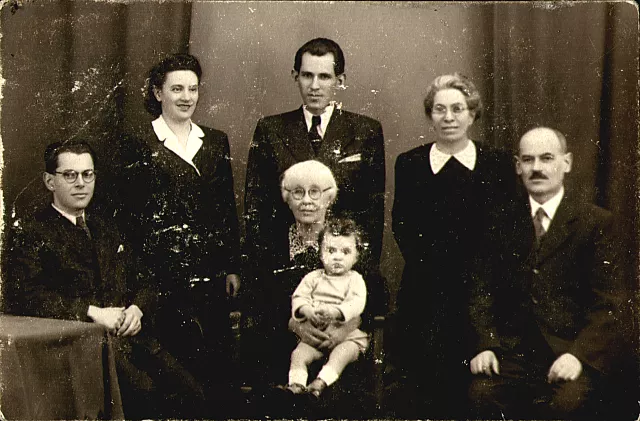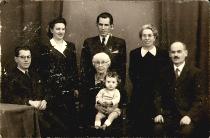Janos Banyai and his family
This is a picture of my husband, Janos Banyai and his family. His maternal grandmother, Lina Kalman nee Markovics, his mother, Judit [Brand] Banyai nee Kalman, his father Adolf [Brand] Banyai, his brother Sandor [Brand] Banyai and his wife Olga Herskovits Banyai and their child Gabriella.
I met my husband through Olga. On Uncle Dezso's advice, I looked up Olga, and told her, 'Hello, I'm Aunt Eszti's daughter.' Aunt Eszti was her aunt. 'I already heard about you, come on, my Olgica', she always called me that. 'I'll run a hot bath for you, but you are a big girl!' But she wasn't like that with just me, but with everybody. And when the war broke out, they took her husband away to forced labor with my later husband. Her husband and my husband were brothers, and they married two cousins, because Olga and I were cousins.
When I looked Olga up, my future husband was living there - Olga's brother-in-law. That's how we met. He was so happy when he first saw me. He could love you excessively. He loved me so much that he always wanted to be with me, and wanted to hear my voice. Now also, until his death, everything was very nice and very good.
Olga, to whom I came, was left alone with her children, her husband ended up in the work service. She was ten years older than me, I was the little Olgi. She was a seamstress, a very good seamstress. She studied under Klara Rotschild [fashion designer, opened a salon in 1934, worked as a state employee after 1945, and was the artistic director of the Clara Salon]. She was an excellent seamstress, if she sewed herself a dress, she sewed one for me. We got along so well, and wore the same dresses.
She had two little daughters, one was four years old in 1944, the other was two. Both of them perished. They hid in Pest. A bomb hit the house next door to the one in which they were hiding, and then they went into the house. They were there for a couple hours, then started out into the street. A Christian woman called out to Olga, said there's an alarm on, why is she walking in the street. She took them in. The woman's husband was very angry that she adopted them. We haven't got anything to eat, why did you bring this woman and her two kids here? She can't feed her kids! And she couldn't, and the girl starved to death. Gabi. The other girl, Zsuzsa died in the hospital, she had some sickness.
After the war, she and her husband moved to Mezohegyes, the man was a head accountant there, but in 1956, [the Revolution] they kicked him out of his job. They picked themselves up, and left for Israel. After the war, they had two children, they were successful, clever, educated. One was six years old, the other eleven years old when they left for Israel. The boy died a hero's death on his twenty-first birthday. Olga was the big woman of the kibbutz, they always had lots of guests, because they really liked her, and she worked to the end of her life. She couldn't stay at home. Olgi sewed there in Israel, too. Sanyi worked poor guy, outside in the orange plant.













